3001 Rivertowne Parkway, Mount Pleasant, SC 29466
(843) 277-9043
crescentcarevet.com
Lowcountry Dog Magazine Brings Back the Largest Adoption Event in the Lowcountry
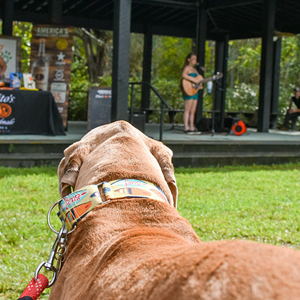
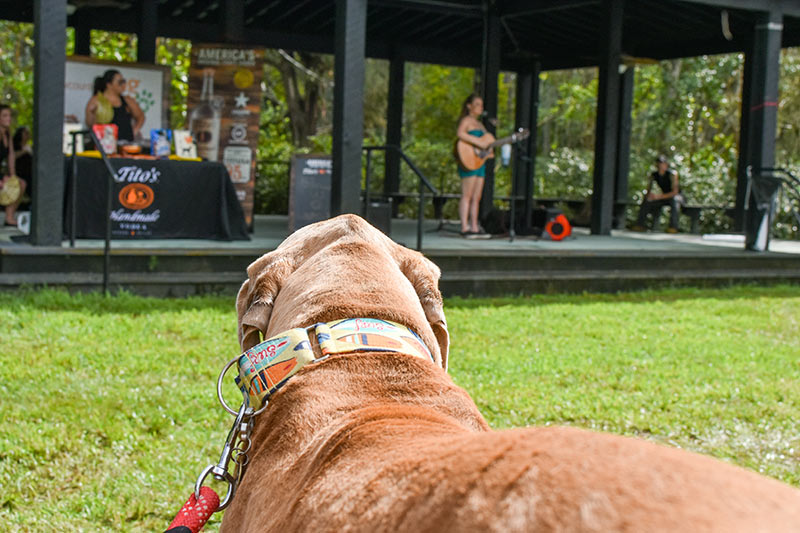 Lowcountry Dog Magazine’s Fourth Annual Dog Adoption Event. Photo credit Stono Tides Photography.
Lowcountry Dog Magazine’s Fourth Annual Dog Adoption Event. Photo credit Stono Tides Photography.
Helping homeless dogs in the Lowcountry is a cause that drives Lowcountry Dog Magazine every day. This Sunday, September 27th at Magnolia Plantation, Lowcountry Dog Magazine is throwing their fourth annual dog adoption event this Sunday from 1 to 5 pm. The event is the largest of its kind in the Lowcountry and will have fifteen different shelters and rescues in attendance. There is no cost to attend the event but admission to the Gardens is optional.
Are you need of another loving companion or just a doggone good time? This event will have dogs from all sizes, breeds and ages. The event is free to attend and will have food and vendors as well. Live music will be featured by local artists Emily Curtis and Lauren Hall.
Flight Food Truck will be serving food and Reed’s Ginger Ale will be giving out free drinks. You are welcome to bring chairs and blankets to enjoy music in the Pavilion field at a safe social distance. The event is dog friendly as well so bring your four-legged friends with you! We kindly ask that all attendees wear masks when interacting with vendors and rescues and maintain social distanced.
Lowcountry Dog Magazine and Magnolia Plantation also gives any adopters during the months of August and September a free one-year family membership to Magnolia Plantation and Gardens, valued at $100. The goal is adopt out 1,000 dogs by the participating rescues. Find out more about the event and participating groups at Lowcountrydog.com/magnolia.
LCD Publisher Brian Foster says, “We started working with Magnolia Plantation in 2016 with the pass giveaway to adopters and in 2017, I had the crazy idea to bring all the rescues and shelters together for one day to offer a fun event to raise awareness of all the options in the Lowcountry when it comes to dog adoption.”
The 2021 Lowcountry Dog Calendar will also be available for sale for pre order at the event for only $10 with all the calendar sales donated to the 15 local groups. Attendees can also join the Lowcountry Dog Society and get magazines, calendars and exclusive offers mailed to their home. The event is proudly sponsored by Tito’s Handmade Vodka, Hollywood Feed, Veterinary Specialty Care and Pet Supplies Plus.
For media questions or contact please reach to
Brian Foster, Publisher
Lowcountry Dog Magazine
[email protected]
843-297-7182
More
Event Flyer (JPG)
Facebook Event Link
Search and Rescue: Pets Find Their Forever Homes in Mount Pleasant
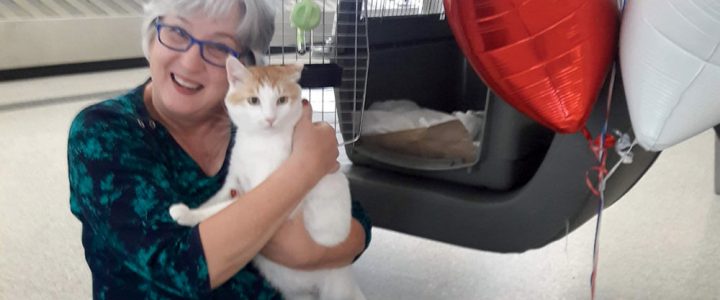
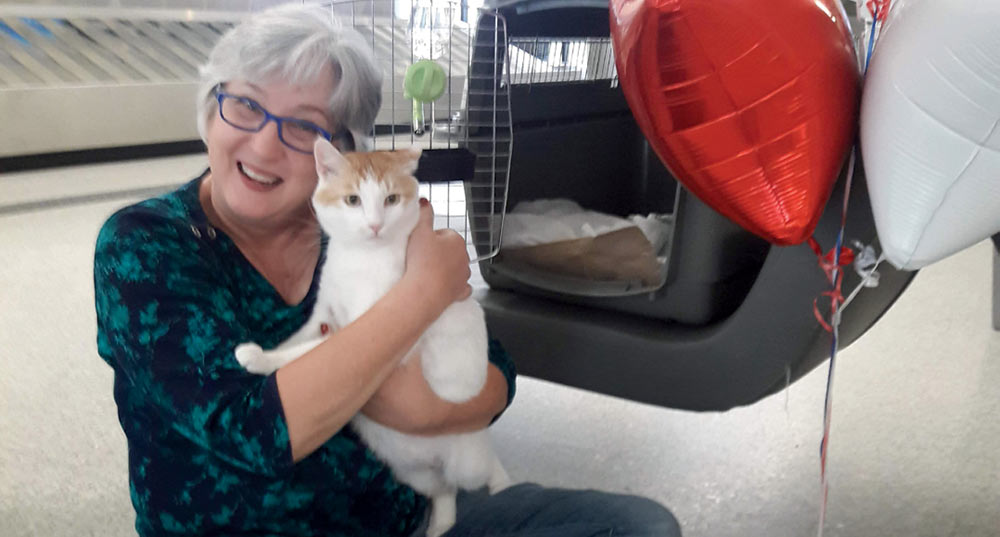
This is a story about something that happens every day but seldom makes the headlines. It is a story of how two different animals without homes were taken in by Lowcountry animal lovers and given the opportunity to live out their days with love, comfort and care.
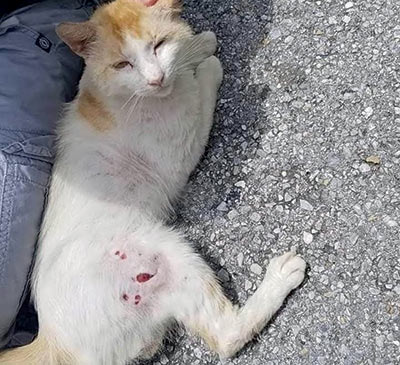 One of these animals is Neville the cat, who began his life half a world away in Okinawa, Japan. A former stray, Neville seemed doomed to a brief and sickly life, until an animal lover took him in and had him examined by a veterinarian.
One of these animals is Neville the cat, who began his life half a world away in Okinawa, Japan. A former stray, Neville seemed doomed to a brief and sickly life, until an animal lover took him in and had him examined by a veterinarian.
Neville was diagnosed with FIV+, or feline immunodeficiency virus. The veterinarian concluded that his only chance for a long pain-free life was to be treated in the United States.
As things happen in stories with happy endings, the scrawny tomcat’s rescuer in Japan was already acquainted with a potential American foster mom: Mary Beth Dew, who lives in the Ivy Hall subdivision of Mount Pleasant.
Dew was certainly no stranger to saving the lives of cats and kittens. She had already fostered around 100 of them for the Charleston Animal Society and Pet Helpers, including another with a case of FIV+. Arrangements were made to transport Neville to Mount Pleasant, and they weren’t simple. His journey spanned 30 hours and involved four different flights.
When he finally arrived, Dew took Neville to her own veterinarian and had him checked out. In his new home, Neville rapidly put on weight — so much so that he had to be placed on a prescription diet. Astonishingly, he even registered a negative test for his FIV+. At this point, Dew would normally reach out to find a “forever home” for her foster feline. But there was just something special about this cat. This one, she couldn’t let go.
So Dew adopted Neville the cat, and he quickly adapted to American life. He has served as a “big brother” to more than two dozen foster cats and kittens and remains “pals” with them after they leave Dew’s care. He goes on play dates, takes walks in what Dew calls his red convertible stroller, talks to her incessantly, sleeps in her bed, climbs out on tree limbs and loves meeting new people. Currently four years of age, he’ll no doubt live many more years in comfort, bringing joy to Dew and everyone else who meets him.
Part two of this story is more personal. A little more than 10 years ago, my wife Judy and I made the big decision to become dog owners, something we’d never done together.
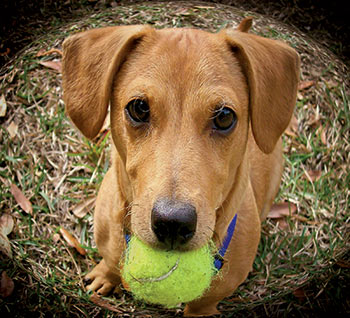 It made no sense to buy a fancy breed from a pet shop when so many dogs need homes, so we went to the Charleston Animal Society’s North Charleston shelter. We agreed that we wanted a big dog, something tough, sturdy and maybe just a little menacing – like a German shepherd or a Rottweiler.
It made no sense to buy a fancy breed from a pet shop when so many dogs need homes, so we went to the Charleston Animal Society’s North Charleston shelter. We agreed that we wanted a big dog, something tough, sturdy and maybe just a little menacing – like a German shepherd or a Rottweiler.
But while there were scores of big, healthy dogs at the shelter, none of those macho mutts made that special connection with us. On our way to the car, dejected, we peered through the chain-link fence into the outdoor exercise area. There stood a man in a business suit, with a brown splotch of color on his shoulders. It was a dog, vigorously — maybe maniacally — licking the man’s ears, neck and face, while a tail wagged like an out-of-control metronome.
Out of curiosity, we went back inside, where we discovered that the man behind the fence was Joe Elmore, Charleston Animal Society’s CEO. The little dog, whom they’d named “Armando,” was a three-month-old who’d been found with several of his littermates in a cardboard box by the road in West Ashley.
All that night, we talked about “Armando.” Sure, he was cute, but he was little — a dachshund and Jack Russell mix, as far as the shelter staff could tell. We wanted a BIG dog.
But by the morning, it was all over. We had to adopt him. Charleston Animal Society confirmed that he would be available, but not that day. That afternoon, he was scheduled to star in a fashion show at Towne Centre in Mount Pleasant.
The next day, we took the little guy home to Charleston National and renamed him “Pal,” partly because my childhood dog was “Buddy,” and we wanted something similar, yet different, and partly as homage to the late, great Jackie Gleason’s signature greeting, “Hiya, Pal!”
Pal turns 11 this year, and he’s as lively and loving as he was that first day at the shelter. He’s had his share of health concerns, among them pancreatitis and Addison’s disease. But great veterinary care and his daily schedule of medications have kept him active and well.
Pal won’t ever win any breed awards because there’s no category he fits into. But when he sleeps in our bed, proudly wears a bright bandana on walks or greets his many human friends with wild excitement, we know that rescuing him was really more like rescuing our own sense of wonder and joy at just being alive.
By Bill Farley
How Service Dogs Have Aided My Recovery: Best Friend on Another Level
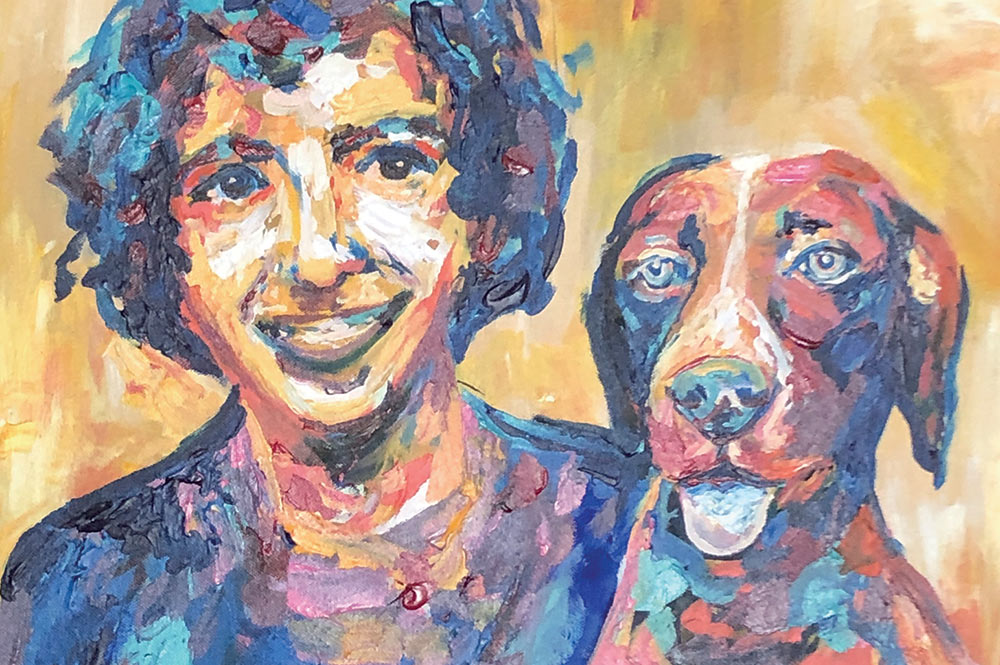
When it comes to thinking about dogs and family, for me, they are one and the same. As far back as my earliest memory, my family always had a canine companion within our home. My last BFF — best furry friend — was Madison, a German shorthaired pointer that we adopted in 2007, my junior year at Wando High School.
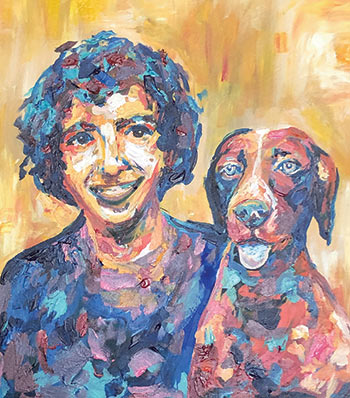 Madison and I were inseparable throughout my final years in the public school system and then my college years. Upon college graduation, I was hired by the school — but soon started itching to add new experiences to my resume, including an opportunity on the West coast. Yes, this would mean committing to the gut-wrenching decision to leave Madison. I knew she would be in good hands with my parents, so off I went to explore California.
Madison and I were inseparable throughout my final years in the public school system and then my college years. Upon college graduation, I was hired by the school — but soon started itching to add new experiences to my resume, including an opportunity on the West coast. Yes, this would mean committing to the gut-wrenching decision to leave Madison. I knew she would be in good hands with my parents, so off I went to explore California.
Six days after moving into an apartment in San Mateo, California, I suffered a traumatic brain injury, or TBI, as a result of a bicycle accident. Thankfully, I was wearing a helmet. After the accident, I spent months in Stanford Hospital’s ICU, an acute care facility in Marin County, California, as well as Shepherd Center’s in-patient rehab in Atlanta. I’ve also endured years of outpatient therapy of all types since returning to the Lowcountry.
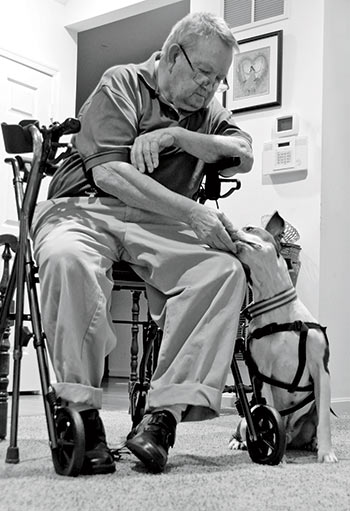 Long story short, I returned to Mount Pleasant after my seven months of in-patient experience. The simple, everyday tasks of walking and talking were still a ways off, but knowing I’d be gaining full recovery at my childhood home — with Madison’s presence — helped me to stay positive. For the next seven years, Madison was my cheerleader, motivator and listener as I navigated life to find my new normal. But these furry companions of ours, unfortunately, don’t live forever, and in December 2019, we had to say goodbye to Madison. She lived to be almost 17 — well past her breed’s life expectancy — and I know she gave me her absolute best.
Long story short, I returned to Mount Pleasant after my seven months of in-patient experience. The simple, everyday tasks of walking and talking were still a ways off, but knowing I’d be gaining full recovery at my childhood home — with Madison’s presence — helped me to stay positive. For the next seven years, Madison was my cheerleader, motivator and listener as I navigated life to find my new normal. But these furry companions of ours, unfortunately, don’t live forever, and in December 2019, we had to say goodbye to Madison. She lived to be almost 17 — well past her breed’s life expectancy — and I know she gave me her absolute best.
A few months before her passing, I began researching options for a new service dog to assist me with critical activities that became more of a challenge after my TBI. I learned about Palmetto Animal Assisted Life Services (PAALS) through Marka Danielle, a friend and survivor of a spinal cord injury. She’d been matched with her very own assisting canine named Cora.
While the application process for these animals is extensive, it is necessary to ensure that these gifted and welltrained dogs are appropriately matched with each applicant’s needs. Unlike an emotional support dog or a therapy dog, a service dog is trained to perform as a helper, responding to cues that will assist and improve the handler’s quality of life. This could be anything from assisting after a fall to retrieving a phone for emergency calls and other tasks.
I hold onto hope that I will soon be paired with my own service dog to help me continue the path to recovery. I look forward to introducing you all to Mount Pleasant’s newest assistive canine sometime in the near future.
DEFINITIONS:
ASSISTANCE/SERVICE DOG: A dog trained to aid or assist an individual with a disability. They are trained by an assistance dog organization or by their handler, often with the help of a professional trainer.
EMOTIONAL SUPPORT DOG: A dog that provides comfort to help relieve the symptoms of a person’s disability. According to the Americans with Disabilities Act, these dogs are not service animals. State and local regulations dictate the rules and acceptance of emotional support pets in public spaces.
THERAPY DOG: A dog that is trained in providing affection, comfort and support to people, often within hospitals, retirement homes, nursing homes, schools, libraries, hospices or disaster areas.
For those wanting to learn more about the varied categories of service animals and the laws pertaining to their acceptance, visit ADA.gov and AssistanceDogsInternational.org.
By Anthony Macchio
Our Beloved State Dog, the Beloved Boykin: From Field, to Home, to Hearts
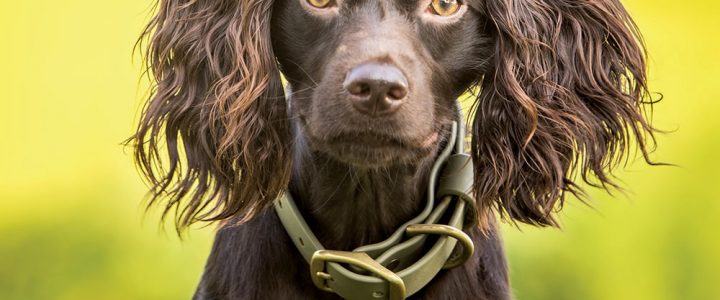
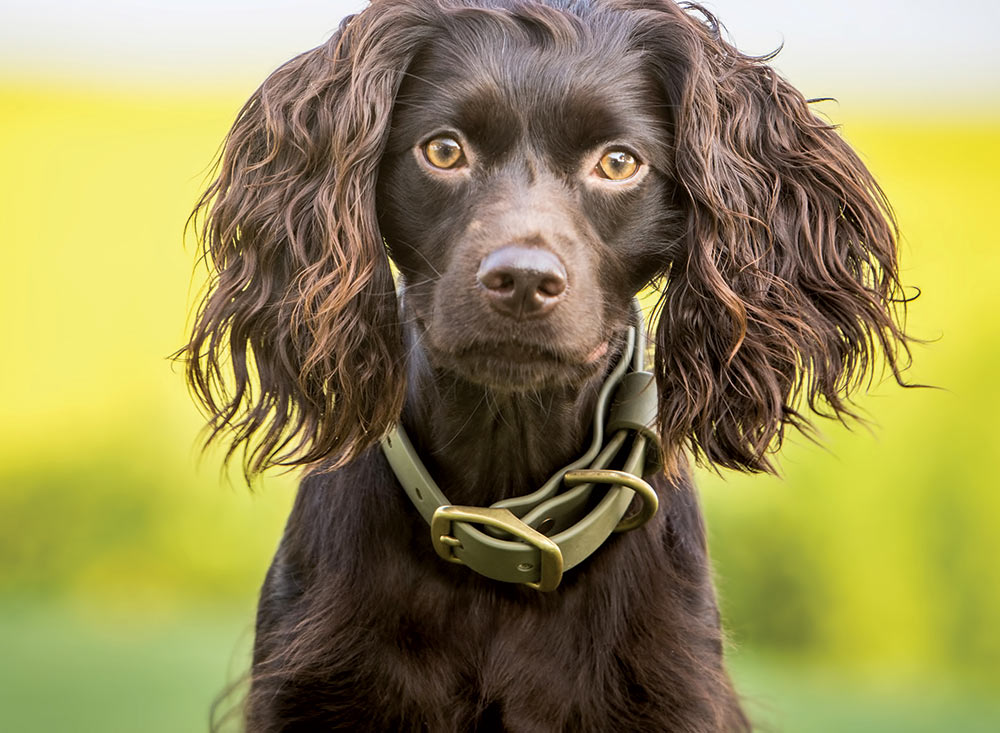
There have been times I’ve been out with one of my dogs and people have asked me, “What kind of dog is that?” I’d reply that my dog is a Boykin spaniel and then engage in polite conversation, asking where they were from. The answers would be assorted — North Carolina, Florida, California, Maine, South Carolina. Yes, even South Carolina.
I was always surprised to hear that South Carolina residents, some who lived here for years, were unaware that we had our own state dog. In 1985, Governor Richard W. Riley recognized the Boykin spaniel as our official state canine. Because South Carolina is one of only 13 states with a designated state dog, we commemorate the special date every September 1, which also happens to be the first day of dove season — the Boykin is, after all, a hunting dog.
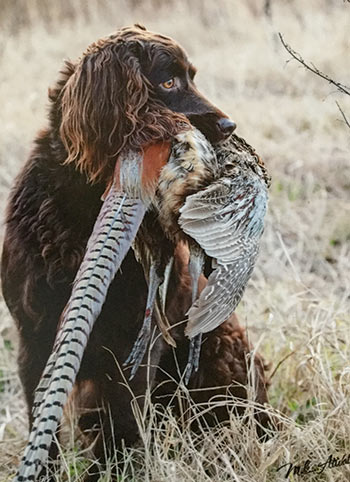 Bred by and for the South Carolina hunter, the many positive traits attributed to Boykins are intelligence, adaptability, athleticism, trainability, affection, socialness, friendliness and versatility. These traits woven together give you our Boykin, also known as a “little brown dog,” “swamp poodle,” “chocolate possum” or “little brown dog that doesn’t rock the boat.” Our state dog goes from field to home and into hearts without missing a step. How did we get so lucky?
Bred by and for the South Carolina hunter, the many positive traits attributed to Boykins are intelligence, adaptability, athleticism, trainability, affection, socialness, friendliness and versatility. These traits woven together give you our Boykin, also known as a “little brown dog,” “swamp poodle,” “chocolate possum” or “little brown dog that doesn’t rock the boat.” Our state dog goes from field to home and into hearts without missing a step. How did we get so lucky?
To answer that question, let’s look back. Years ago, a small brown dog — later named Dumpy — wandered across the path of Mr. Alexander White, who was on his way home from church in Spartanburg. The pup was soon discovered to be an eager retriever, demonstrating qualities hunters seek in a companion: enthusiasm, endurance and willingness to please. Mr. White, recognizing the potential of this pup, sent him off to be trained by his friend and well-known sportsman, Mr. Lemuel Whitaker Boykin. Boykin noted Dumpy’s qualities, and, with selective breeding with Cocker spaniels, Springer spaniels, American water spaniels and Chesapeake Bay retrievers, developed the dog we’ve come to know and love today. The Boykin was originally bred as a turkey dog and waterfowl retriever to accompany hunters in the Wateree River Swamp.
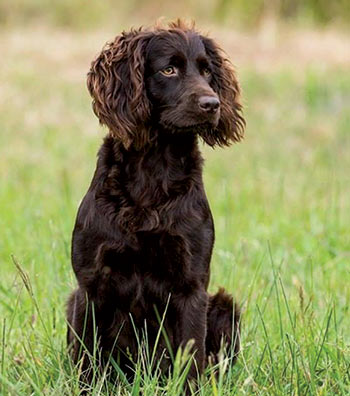 As the popularity of the Boykin grew, there was a need to record the breed’s growth and preserve the breed by establishing standards and encouraging good sportsmanship. The Boykin Spaniel Society was formed in 1977, and the Registry followed in 1979. In 1996, the Boykin Spaniel Foundation was established as a nonprofit to support health research and education of inherited disease in the breed. The United Kennel Club and the American Kennel Club also recognize the Boykin spaniel as a retriever suited for both water and upland hunting.
As the popularity of the Boykin grew, there was a need to record the breed’s growth and preserve the breed by establishing standards and encouraging good sportsmanship. The Boykin Spaniel Society was formed in 1977, and the Registry followed in 1979. In 1996, the Boykin Spaniel Foundation was established as a nonprofit to support health research and education of inherited disease in the breed. The United Kennel Club and the American Kennel Club also recognize the Boykin spaniel as a retriever suited for both water and upland hunting.
The Boykin is first and foremost a hunting companion, but they are also very versatile dogs. Boykins are loyal, affectionate and social, always ready to go for a walk or boat ride. There are other avenues to explore as well, such as obedience training, therapy dog training, scent work, dock diving and more. You may find yourself interested in conformation and the opportunity to educate the general public about Boykins. Whatever activity you choose, these devoted dogs are easy to please, with a willingness to learn.
If you want to foster or adopt, there is a Boykin Spaniel Rescue that can always use volunteers to further its mission to rescue, rehabilitate and re-home at-risk purebreds.
Having a Boykin — or two, or three — is a rewarding journey. And, of course, there is something to be said for enjoying the great outdoors of our state with the official dog of South Carolina by your side.
Leslie Kern at Thornhill Kennels has been a Boykin spaniel breeder for 15 years and is a Gold Level Preferred Breeder with the Boykin Spaniel Society and a Breeder of Merit with the AKC. Her dogs hunt and compete in hunt tests and field trials, as well as many of the other sports opportunities available in the BSS, UKC and AKC. She lives in Beaufort with her husband, Beau, and their eight Boykin spaniels.
By Leslie Kern
